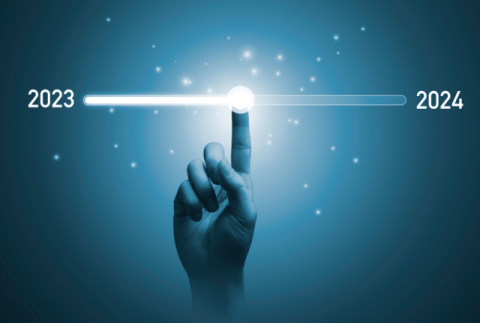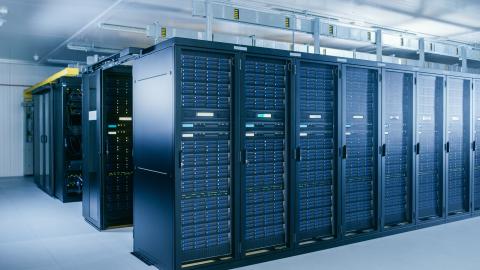2023: The Tech Year in Review
December 28, 20232023 saw technological innovations and computing breakthroughs that can still seem impossible to comprehend. Tech giants have created new devices that are blending the real and virtual worlds, while the government and private research labs are driving technology’s power, capacity, and capabilities to new heights.
Here’s a look at five of the most exciting and impactful technological advancements from the past year.
The Rise of Generative AI
Artificial intelligence has dominated the techsphere for years, and 2023 witnessed a seismic shift with the rise of generative AI. Large language models (LLMs), like OpenAI's ChatGPT and Google's Bard, captivated audiences with their ability to mimic human writing and create art with increased accuracy, consistency, and comprehension. LLMs immediately began revolutionizing sectors like education, business, and content creation, with omnipresent chatbots increasing knowledge access and improving communication.
Generative AI also infiltrated the creative realm, with companies like Canva and Adobe integrating AI tools into their software. From AI-powered website generators to video editing with text prompts, the technology aimed to empower, not replace, creators. Time will tell if this holds true.
This growth also fueled a new wave of AI career opportunities like prompt engineers and AI content creators, while initiating a new arms race between hardware manufacturers like Intel, AMD, and Nvidia to create chips that can push the limits of GPUs and RAM.
However, bias and errors from their training data remain common, raising ethical concerns about potential misuse. Their lack of true understanding and reasoning means they can mimic, but not truly comprehend, human communication. As capabilities advance, ethical considerations, responsible development, and public awareness will remain critical counterpoints to generative AI’s rapid growth.
Immersive Technology Takes Center Stage
With the metaverse buzzing in the background, 2023 witnessed two heavyweight contenders stepping into the immersive tech ring to offer distinct approaches.
Apple's Vision Pro was unveiled at the company’s Worldwide Developers Conference in June. Equipped with an M2 chip and revolutionary spatial computing power, it promised cutting-edge mixed reality experiences. Though the device emphasized high-end experiences and its capabilities impressed industry insiders, the $3,499 price tag raised eyebrows, and production delays pushed the Vision Pro’s arrival to 2024.
In September, Meta countered Apple’s Vision Pro with the Meta Quest 3, which emphasized inclusivity and affordability. Powered by the Snapdragon XR2 Gen 2 chip, this iteration offered robust augmented and virtual reality experiences at a more accessible $500 price point. This strategic move garnered positive feedback, proving that immersive tech needn't break the bank to engage users.
Concerns over affordability, content availability, and the potential pitfalls of the metaverse itself remain. However, the introduction of devices from two tech giants suggests that immersive tech is not just a futuristic gimmick, but a potentially transformative force poised to impact how people interact with the world.
Quantum Computing Emerges from the Lab
2023 marked a pivotal year for quantum computing, with advancements moving it from a science fiction dream to a new reality. At the forefront, December witnessed a landmark achievement when researchers built the first quantum circuit with logical qubits, paving the way for fault-tolerant quantum computing. This groundbreaking step tackles a major hurdle, as qubits are notoriously fragile, and error correction is crucial for reliable computations.
Google continued to drive quantum computing development through its error-corrected quantum chip and advancements in error correction algorithms. These steps translate theory into practical solutions, bringing fault tolerance closer to reality. Similarly, IBM unveiled its Heron processor, which boasts the highest performance and lowest error rates within its quantum systems. It also showcased IBM Quantum System Two, a modular quantum computer that lays the foundation for future supercomputing architectures.
These successes signify a shift in the quantum landscape from "can it be done?" to "how do we make it work?" — which is helping to launch new career opportunities. While challenges like scalability and cost remain, these advancements will fuel new research, attract broader investment, and potentially lead to the first real-world applications of quantum computing in 2024.
Frontier Supercomputer Promises a New Era of Scientific Discovery
2023 saw the increased power of Frontier, the world's first exascale supercomputer that is shattering the limits of scientific exploration and ushering in a new era of discovery. Frontier boasts a staggering processing power of 1.194 exaflops, capable of performing a mind-boggling one quintillion calculations per second. The size of two tennis courts, Frontier’s physical footprint is home to more than 8 million combined cores.
Frontier will help researchers better understand our universe by exploring mysteries like dark energy and dark matter. Cancer research and new drug development will benefit from simulations on an unprecedented scale. Weather forecasting and climate modeling will reach new levels of accuracy, potentially allowing for better prediction and mitigation of natural disasters. And it promises to propel innovation in fields like materials science and nuclear energy, while paving the way for further advancements in exascale computing.
5G Showcases a Connectivity Revolution
Wireless connectivity took a major leap forward in 2023, as 5G networks rolled out at an unprecedented pace. Global telecom giants harnessed the transformative power of 5G, offering blazing-fast speeds and near-instantaneous data transfer.
5G offers supercharged speeds that increase bandwidth and reduce latency that let users download movies in seconds, experience lag-free video conferencing, and introduce a variety of other applications and experiences. 5G has also given a massive boost to the Internet of Things ecosystem and is providing the critical backbone for the seamless integration of AI and immersive technologies like virtual and augmented reality. Through these developments, AI-powered devices may soon be able to learn and adapt in real-time and experience virtual worlds with lifelike precision.
Demonstrating the near-immediate pace of innovation in tech, research into 6G networks is already underway. Its development may bring digital communications with near-zero delay, enabling real-time communications that will reshape personalized health care, manufacturing, and entertainment. These advances signal a fundamental shift in how we connect, access information, and interact with the world.
Into 2024 and Beyond
2023 offered incredible technological advancements. As the calendar turns, new breakthroughs and innovations will drive these technologies forward while making others obsolete. New devices, capabilities, and uses will emerge. Concerns will be raised about responsible development, ethical use, and equitable access. And with near certainty, 2024 will usher in a new wave of technological advancements that will have a profound impact on the way people live, work, and interact with the world.
For more information on Capitol Technology’s degree programs, contact our Admissions team at admissions@captechu.edu.








